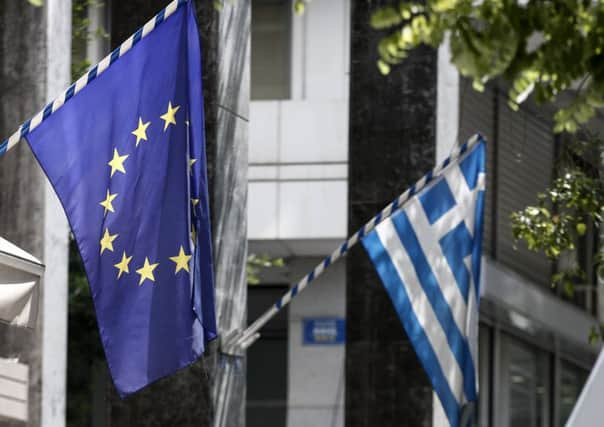Eurozone leaders to stage emergency Greek summit


Poland’s Donald Tusk, who chairs meetings of European leaders, said he had decided to convene a eurozone summit for Monday evening to “urgently discuss the situation of Greece at the highest political level.”
That means Greece’s prime minister will meet his peers, including German chancellor Angela Merkel.
Advertisement
Hide AdAdvertisement
Hide AdHis statement came after the eurozone’s top official, Jeroen Dijsselbloem, said no progress was made in discussions held among finance ministers in Luxembourg. He said Greece proposed too few measures that are credible and serious and that the talks over the past few weeks “have not progressed.”
Greece needs outside financial help if it is to meet debt repayments this summer, starting with €1.6 billion it owes on 30 June. Without a deal it faces going bankrupt and even leaving the euro union.
Mr Dijsselbloem said a deal was still possible and that he and his peers were “very committed” to keep Greece in the eurozone.
“Greece needs to become financially independent,” he said. “Any deal that simply doesn’t deliver that … would be also a bad deal for the Greek people.”
Officials acknowledged that Greece’s exit from the euro – or “Grexit” – was now being discussed and that contingency plans were being made. As fears of a potential Grexit have swelled, there have been signs that Greeks are withdrawing money from their banks in increasing amounts.
Greece’s radical left-led government has been locked in discussions with international creditors since its election in January over what economic reforms and budget cuts it needs to make to get the remaining €7.2bn available in its bailout fund.
The IMF said Greece’s debt obligation at the end of the month is not up for negotiation.
“There is no period of grace of one or two months as I have read here and there,” said the IMF’s managing director, Christine Lagarde. “It’s due on 30 June.”
Advertisement
Hide AdAdvertisement
Hide AdIn Athens, at least 6,000 people gathered outside the Greek parliament in a peaceful demonstration backing the country’s membership in the currency zone and the European Union.
Scores of demonstrators, waving Greek flags, climbed the marble staircase leading to the threshold of the parliament building. Among the crowd were several opposition politicians.
Meanwhile, police blocked a planned march by 200 anarchists in the area. The anarchists were protesting against capitalism, the government and Greece’s creditors.
On Wednesday evening, about 7,000 people held an anti-austerity rally outside the parliament, waving the flags of Greece and the governing radical left Syriza party.
The Greek government wants an end to the budget austerity measures that have accompanied the country’s bailout loans for five years. It has also been seeking some sort of restructuring of the country’s sky-high debt burden, which stands at near 180 per cent of annual GDP. That could take the form of lower interest rates on the debt or extending the date by which the debts have to be repaid.